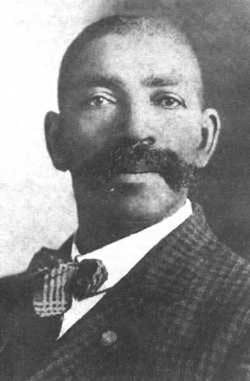I've been reading and doing background on this month's Legendary Lawman for a few months now. I was originally going to run this article in February to coincide with Black History month, but thanks to an email from a reader (thanks Kirk) I've pushed it up. To say this month's lawman was noteworthy or remarkable would be a travesty; a complete understatement. He paved the way for many and remains an incredible example to law enforcement. He is Bass Reeves.
Most of the early history has to be taken with a grain of salt as there were very little written records when it comes to slave history and genealogy. Actually, nearly every fact found prior to 1875 has conflicting information. Your mileage may vary...
Although the 1900 Federal Census gave his birth date as July 1840, most records support him being born of slave parents in July 1838 in Paris, Texas (Crawford County). His last name was taken from his owner, William S. Reeves. The family moved to Grayson County, Texas in 1846. During the Civil War he would become a fugitive and flee to the Indian Territory (now Oklahoma) and would find refuge with the Creek and Seminole Indians. Exactly how he became a runaway is up for dispute as there are two versions to the story. Space doesn't allow me to get into details but this is an interesting story unto itself. Some believe he served in the irregular Union Army fighting alongside the Union Indians.
Following the war and being freed by the Emancipation Proclamation (and no longer a fugitive) Reeves left Indian Territory and bought land near Van Buren, Arkansas. A year later, he married Nellie Jennie from Texas, and immediately began to start a family. Raising ten children on their homestead - five girls and five boys - the family lived happily on the farm. That is until Isaac C. Parker was appointed to the bench of the Federal Western District Court on May 10, 1875. Judge Parker immediately set out to tame the lawlessness within the territory and appointed U.S. Federal Marshal James Fagan and told him to hire 200 deputies. Fagan knew about Bass Reeves and was aware that he had knowledge of the area as well as linguistic skill and appointed Reeves as a U.S. Deputy. Bear in mind that was only ten years after the declared end of the Civil War.
An imposing figure, Reeves stood six feet two inches tall and settlers said he could whip any two men with his bare hands. Reeves also claimed the largest number of outlaws he ever caught at one time was nineteen horse thieves he captured near Fort Sill, Oklahoma. Noted female outlaw Belle Star (a friend of Reeves) turned herself in at Fort Smith when she found out he had the warrant for her arrest. He was particularly noted for wearing two Colt revolvers in .38-.40 butt forward for a fast draw. It probably didn't hurt that he was ambidextrous, shooting proficiently right or left handed. When not using his Colts he used his fine Winchester rifle, also chambered for the same .38-.40 cartridge. He was such an expert with pistols and rifles that later in his life he wasn't even allowed to compete in local turkey shoots because his skill was far superior to any competition.
Like many lawmen of this time, Reeves also had some run-ins with the law himself. In January 1886, he was arrested for the murder of his cook. The incident occurred in August of 1884. While making his rounds in the Chickasaw Nation, Reeves and William Leach (the cook) got into a heated argument. The story seems to have developed from an incident when Leach threw hot grease on Reeve's dog. Reeves allegedly pointed his rifle at Leach and shot him, causing him to fall forward on to the fire. Bail was set at $3000, an enormous amount of money at the time. Reeves posted his bond and hired his own lawyers. They were able to prove that the shooting was an accident and that a doctor was called in to tend to Leach but could not save him. The trial concluded in October 1887 with Reeves returning to work almost immediately. His finances never did recover from this ordeal.
November 27, 1890 saw Reeves and his posse attempt to capture the infamous outlaw Ned Christie, thought by many to be the most feared outlaw in the Indian Territory. Christie had been on the run since May 1887 and had successfully eluded or out shot his pursuers. Apparently Christie was run to ground in a makeshift fort he had built near Vinita, Oklahoma. An extended gunfight resulted in the fort being burnt to the ground, but Christie escaped once again, swearing to kill Bass Reeves. The complete story of this ordeal is worthy of a book all by itself. I may have to elaborate on this story in the future is there is interest.
In 1893, Reeves was transferred to the East Texas federal court in Paris, Texas and stationed at Calvin in the Choctaw Nation. In 1897 he was again transferred, this time to the Muskogee federal court within the Indian Territory. Here Reeves would marry again (1900) to Winnie Sumter. He first wife had passed away in Fort Smith (1896).
While these and many more of his exploits are in fact legendary, the greatest act of character was still to come. After having delivered two prisoners to U.S. Marshal Leo Bennett in Muskogee, Oklahoma, he arrived to bad news. His son had been charged with the murder of his wife. The warrant had been lying on Bennett's desk for two days. It seems the other deputies were reluctant to take it and though Reeves was shaken, he accepted the responsibility for finding his son. Two weeks later, Reeves returned to Muskogee with his son in tow and turned him over to Marshal Bennett. His son was tried and sent to Kansas' Leavenworth Prison. However, sometime later, with a citizen's petition and an exemplary prison record, his son was pardoned and lived the rest of his life as a model citizen.
Reeves would work as a Marshal until 1907; the year Oklahoma would gain its statehood. At this time he became a police officer for the city of Muskogee. During the two years that he served in this capacity there were, remarkably, no reported crimes on his beat. Reeves was diagnosed with Bright's disease in 1909, finally ending his career in law enforcement. He died January 12, 1910 and though he was buried in Muskogee, Oklahoma, the exact location of his grave is unknown.
Reeves is reported to have apprehended more then 3,000 outlaws during his 35 years serving as a Deputy United States Marshal. Having killed 14 men during that time he always said he "never shot a man when it was not necessary for him to do so in the discharge of his duty to save his own life." Feel free to drop me a line if you'd like to learn more about Deputy Marshal Bass Reeves.

Charles Bennett
Charles Bennett was born in our Nation's Capital and grew up in the Maryland suburbs. Mr. Bennett has been working in all aspects of the publishing industry since the late 1980s primarily in the fields of commercial photography and magazine production. Moving to California in 1992 to attend college resulted in B.F.A and Masters degrees. California also supplied Mr. Bennett with his wife. The two of them are avid sports persons and participate in shooting, scuba diving, surfing, running and bicycling. As a long time hobby Mr. Bennett has studied the legends of American law enforcement which led to his writing these columns.



